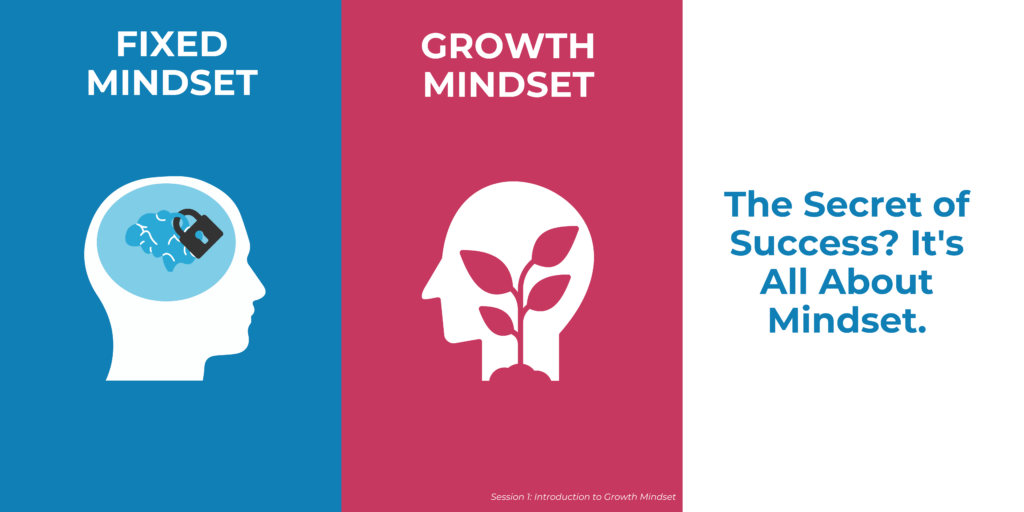Cultivating a growth mindset has the power to transform not only how you approach your work but also how you navigate challenges, give and receive feedback, and pursue your personal and professional goals.
A growth mindset is the belief that your abilities, intelligence, and skills are not fixed traits. Instead, they can be developed through effort, learning, and persistence. It’s about embracing challenges as opportunities to grow, seeing failure as a steppingstone rather than a stopping point, and viewing feedback as a valuable tool for improvement.
In contrast, a fixed mindset is the belief that your abilities are static—something you’re either born with or not. In a fixed mindset, challenges can feel like threats, mistakes can feel like proof of inadequacy, and feedback can feel like criticism rather than guidance.
Think about this for a moment: how often do you catch yourself thinking, ‘I’m just not good at this,’ or, ‘I’ll never be able to learn that’? Those are examples of fixed mindset thinking.
The good news is mindsets are not set in stone. You can cultivate a growth mindset by being intentional about how you think, act, and respond to the world around you.
That’s what a growth mindset is all about:
- seeing challenges as opportunities
- learning from setbacks, and
- staying open to new possibilities
Reframing and Growth Mindset
Reframing is the ability to view challenges, setbacks, or feedback from a different perspective—transforming obstacles into opportunities for learning and growth. It’s a core practice of a growth mindset, which emphasizes that abilities and intelligence can be developed through effort, perseverance, and adaptability.
Instead of seeing failures as proof of limitations, reframing encourages individuals to ask, “What can I learn from this?” This mindset fosters resilience, innovation, and continuous improvement, helping individuals and teams thrive in dynamic and challenging environments.
The Benefits of a Growth Mindset:
Practicing the skill of a growth mindset offers numerous benefits, both personally and professionally. Here are the key advantages:
1. Improved Resilience
- Benefit: You’re better able to handle setbacks, challenges, and failures without giving up.
- Why: Growth mindset encourages seeing obstacles as opportunities to learn and grow.
2. Greater Learning and Development
- Benefit: You’re more open to acquiring new skills and knowledge.
- Why: A growth mindset fosters curiosity and persistence, making continuous improvement a habit.
3. Enhanced Problem-Solving
- Benefit: You approach challenges creatively and persistently.
- Why: Instead of focusing on limitations, you explore possibilities and solutions.
4. Better Feedback Response
- Benefit: You use feedback as a tool for improvement, rather than seeing it as criticism.
- Why: Growth mindset reframes feedback as valuable guidance for growth.
5. Increased Confidence
- Benefit: You feel more capable of tackling new tasks and taking risks.
- Why: Growth mindset builds belief in your ability to develop and improve over time.
6. Improved Relationships
- Benefit: You foster stronger collaboration and support within teams or groups.
- Why: Growth mindset encourages empathy, active listening, and learning from others.
7. More Motivation and Engagement
- Benefit: You stay motivated to pursue goals, even when the path gets tough.
- Why: Growth mindset shifts focus from outcomes to the learning journey itself.
8. Higher Performance
- Benefit: You achieve better results over time through persistence and adaptability.
- Why: Growth mindset encourages sustained effort and innovation.
9. Openness to Change
- Benefit: You adapt more easily to new situations or roles.
- Why: A growth mindset frames change as an opportunity to learn and grow, not a threat.
Fixed and Growth Mindset Statements
Here’s a list of fixed mindset statements paired with their growth mindset alternatives to highlight how reframing thoughts can foster a growth-oriented perspective:
1. Facing Challenges
- Fixed Mindset: “This is too hard; I can’t do it.”
- Growth Mindset: “This is hard, but with effort and persistence, I can figure it out.”
2. Learning New Skills
- Fixed Mindset: “I’m just not good at this.”
- Growth Mindset: “I’m not good at this yet, but I can improve with practice.”
3. Receiving Feedback
- Fixed Mindset: “Criticism means I’m not good enough.”
- Growth Mindset: “Feedback is a tool to help me grow and improve.”
4. Making Mistakes
- Fixed Mindset: “I failed, so I must not be capable.”
- Growth Mindset: “Failure is a learning opportunity that helps me grow stronger.”
5. Comparing to Others
- Fixed Mindset: “They’re so much better than me; I’ll never catch up.”
- Growth Mindset: “I can learn from their strengths and apply that to my own growth.”
6. Dealing with Obstacles
- Fixed Mindset: “This obstacle is stopping me.”
- Growth Mindset: “This obstacle is challenging me to think creatively and find a new way forward.”
7. Effort and Perseverance
- Fixed Mindset: “If I have to try this hard, I’m just not talented enough.”
- Growth Mindset: “Effort is how I learn and grow stronger.”
8. Taking Risks
- Fixed Mindset: “What if I fail? It’s not worth the risk.”
- Growth Mindset: “Even if I fail, I’ll gain valuable experience to help me improve.”
9. Public Perception
- Fixed Mindset: “If I don’t succeed, everyone will think I’m a failure.”
- Growth Mindset: “What others think doesn’t define me; my growth and effort matter most.”
10. Goal Setting
- Fixed Mindset: “That goal is too ambitious for me.”
- Growth Mindset: “That goal is a challenge, but with dedication, I can make progress.”
11. Dealing with Time Constraints
- Fixed Mindset: “I don’t have enough time to learn this.”
- Growth Mindset: “I can prioritize and make time to focus on learning this step by step.”
12. Handling Pressure
- Fixed Mindset: “I’m just not good under pressure.”
- Growth Mindset: “I can develop strategies to handle pressure more effectively.”
13. Tackling Innovation
- Fixed Mindset: “I can’t come up with creative ideas.”
- Growth Mindset: “Creativity is a skill I can improve by exploring new perspectives.”
14. Learning from Others
- Fixed Mindset: “I don’t want to ask for help; it will make me look incompetent.”
- Growth Mindset: “Asking for help is a smart way to learn and grow faster.”
15. Facing Setbacks
- Fixed Mindset: “This setback proves I’m not cut out for this.”
- Growth Mindset: “This setback is a chance to reassess, learn, and try again.”
16. Career Advancement
- Fixed Mindset: “I’m not ready for that promotion; I’ll fail if I try.”
- Growth Mindset: “Taking on that challenge will help me grow, even if it’s uncomfortable at first.”
17. Perfectionism
- Fixed Mindset: “If I can’t do it perfectly, I don’t want to try.”
- Growth Mindset: “Progress is more important than perfection; I can improve along the way.”
18. Past Failures
- Fixed Mindset: “I’ve failed before, so I’ll probably fail again.”
- Growth Mindset: “My past failures are lessons I can use to succeed in the future.”
19. Team Collaboration
- Fixed Mindset: “I work better alone; I’m not good at collaborating.”
- Growth Mindset: “I can improve my collaboration skills by practicing and learning from others.”
20. Long-Term Goals
- Fixed Mindset: “It’s going to take too long to reach my goal, so it’s not worth it.”
- Growth Mindset: “Every small step I take brings me closer to my goal, no matter how long it takes.”
21. Facing Uncertainty
- Fixed Mindset: “I don’t know what to do, so I’m stuck.”
- Growth Mindset: “Not knowing is the first step to learning; I can figure it out with time and effort.”
22. Adapting to Change
- Fixed Mindset: “I hate change; it’s too hard to adjust.”
- Growth Mindset: “Change is an opportunity to grow and try new approaches.”
23. Leadership Challenges
- Fixed Mindset: “I’m not a natural leader; I can’t handle this role.”
- Growth Mindset: “Leadership is a skill I can develop with practice and feedback.”
24. Handling Conflict
- Fixed Mindset: “I avoid conflict because I’m not good at resolving it.”
- Growth Mindset: “Conflict is an opportunity to improve communication and find solutions.”
25. Overcoming Doubts
- Fixed Mindset: “I’ll never be confident enough to succeed.”
- Growth Mindset: “Confidence grows with experience, and I’ll build it by trying.”
26. Learning from Feedback
- Fixed Mindset: “If they’re criticizing me, it must mean I’m doing a bad job.”
- Growth Mindset: “Criticism helps me identify areas where I can improve and grow stronger.”
27. Dealing with Rejections
- Fixed Mindset: “Being rejected means I’m not good enough.”
- Growth Mindset: “Rejection is feedback that helps me refine and improve for the next opportunity.”
28. Comparing to High Performers
- Fixed Mindset: “I’ll never be as good as my top-performing colleagues.”
- Growth Mindset: “I can learn from my colleagues’ strengths and apply those lessons to improve myself.”
29. Tackling Big Projects
- Fixed Mindset: “This project is too overwhelming; I can’t handle it.”
- Growth Mindset: “I can break this project into smaller steps and tackle them one at a time.”
30. Trying Something New
- Fixed Mindset: “I’m afraid to try this because I don’t want to fail.”
- Growth Mindset: “Trying something new is how I learn and discover what I’m capable of.”
Growth Mindset Questions
5 Questions to develop a growth mindset
- What did you learn from today’s performance?
- What steps did you take to make you successful today?
- What are some different strategies you could have used?
- How did you keep going when things get tough?
- What can you learn from your opponent today?
5 Growth Mindset Comments – Giving Feedback
- “This will be a challenging concept to learn, but I believe you can master it.”
- “You haven’t got it yet, but you will if you keep working and thinking about it.”
- “I really appreciated your effort today.”
- “It is OK to take risks. That is how we learn.”
- “Getting better takes time, and I see you improving.”
10 Growth Mindset Questions – Prioritizing
Here are 10 growth mindset questions for you to ask yourself when prioritizing tasks and being realistic about time management:
- What criteria am I using to prioritize tasks, and does it align with my overall goals and values?
- Which tasks will have the most significant impact, and how can I make time for them first?
- Are there any tasks that I can delegate, eliminate, or postpone without compromising quality or outcomes?
- How can I break down complex tasks into smaller, manageable steps to better estimate the time required?
- What assumptions am I making about how long tasks will take, and how can I validate or adjust those estimates?
- How might unexpected challenges or interruptions impact my plan, and what can I do to minimize their impact?
- What past experiences can I draw upon to more accurately estimate the time needed for similar tasks?
- Am I allocating time for rest, reflection, and unexpected changes, and how might this buffer benefit my effectiveness?
- How can I learn to say no or set boundaries around less critical tasks to focus on my highest priorities?
- What methods can I use to track and review my progress, so I can refine my task prioritization and time estimation skills over time?





